THE TREATY OF VERSAILLES AND ITS CONSEQUENCES
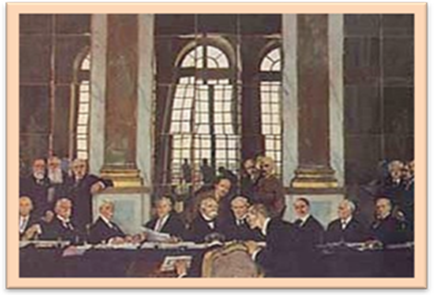
The Signing of the
Treaty of Versailles
Unit
Overview
The
leaders of the victorious nations arrived at the Palace of Versailles to design
a plan that would officially end World War I.†
The conflicting ambitions of the major powers made a just settlement an
impossible task.† However, Europe did
experience a recovery in the decade following the war, but its nations also
became dependent on loans from the United States.† The collapse of the American stock market and
its aftershocks changed the course of twentieth century history.† Letís see how it all happened.
STOP:† Answer Section A Questions
The
Challenges and the Expectations
Once
the armistice was signed, the nations involved in World War I began to assess
the damages and the cost of rebuilding.†
Since most of the fighting had taken place on the European continent,
factories, homes and farms had been destroyed.†
Any hope of a quick recovery was further diminished by the lack of
international trade and severely limited production.†† Every country had used their economic power
to further the war effort, and the cost of supporting the military exceeded all
pre-war estimates.† The German answer to
this problem was simply to print more money.†
This resulted in spiraling inflation
which devalued salaries and savings.† The
success of Great Britainís naval blockade reduced food supplies in Germany to
the point where large numbers of citizens actually starved to death.† After the abdication of Kaiser Wilhelm II,
Germany became a republic, but the new government soon found the problems to be
overwhelming.† As the war ended, Europe
also experienced a major health crisis.†
A pandemic, known as Spanish Influenza, caused the deaths of
over twenty-two million people including forty percent of the population of
Spain.
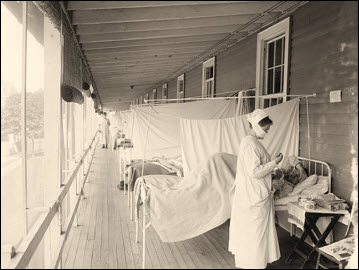
American Nurses
Caring for Spanish Flu Victims
As
the focus turned to the creation of a peaceful settlement, every country had
its own agenda.† Ethnic groups within
former empires looked forward to having their own nations, and Europeís
colonial populations anticipated greater rights in exchange for fighting for
their rulers.† No one knew what to expect
from the new Communist government in Russia.†
The war had also done little to decrease the bitterness and hatred among
the nations of Europe.† The Germans were
hoping for fair treatment since they had agreed to a cease-fire, and the French
planned to make the enemy pay.† The British
knew the value of trade with Germany but thought that the enemy needed to be
punished.† How could all of these
conflicting views be accommodated in a peaceful settlement?† Almost everyone believed that the President
of the United States had a workable plan.
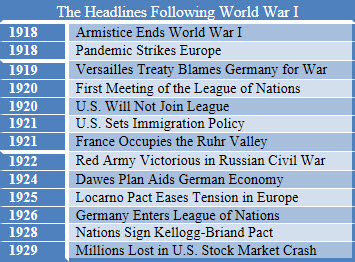 †††
†††
STOP:† Answer Section B Questions
A Man
with a Plan
As
American troops arrived in Europe to fight for the Allied cause, President Woodrow Wilson drew up a plan for peace
with a series of proposals called the Fourteen
Points.† He encouraged free trade,
smaller armies, open agreements between nations and the formation of an
international organization to resolve world problems called the League of Nations in which member
countries pledged to come to the aid of any member that was threatened.† Wilsonís other ideas for a lasting peace
centered on self-determinism.† This concept stressed that people should
choose their own national governments through free elections and should live
within clearly defined borders.† However,
President Wilson firmly believed the most essential element within his program
was the League of Nations.
In
January of 1919, world leaders arrived at the Palace of Versailles to begin working on a series of treaties.†† Known as the Peace of Paris, they would officially mark the end of World War
I.† Woodrow Wilsonís arrival was greeted
with optimism and enthusiasm since most Europeans believed his presence would
assure a fair and just settlement.†
However, each participating country defined a fair and just settlement
according to its own expectations.† As a
result, Wilson faced an impossible task.†
The Russians were not invited to attend, and the defeated nations were
not permitted to participate in any discussions on the issues.† Most of the decisions were made by the men
who became known as the Big Three:† David
Lloyd George of Great Britain, Georges
Clemenceau of France and Woodrow Wilson of the United States.† The Prime Minister of Italy, Vittorio Orlando, expected to be
treated as an equal in the proceedings but was excluded on most major
determinations.† However, Wilsonís plan
for the League of Nations forced him to compromise with the British and French
leaders on many other provisions of the treaties.
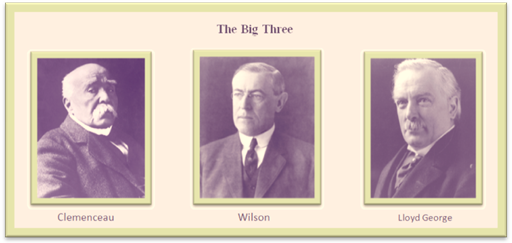
The
Paris Peace Conference resulted in five separate agreements with the nations
that made up the Central Powers.† For
Germany, the terms were harsh and severe.†
The Alsace and Lorraine, two
provinces taken by Germany in 1871, were returned to France.† France also won the right to work the German
mines of the Saar Valley for the
next fifteen years.† A large strip of
German land including the seaport city of Danzig
became part of Poland and was known as the Polish
Corridor.† German holdings in Asia
and Africa were to be administered as mandates
(territories governed by members of the League of Nations until they were
considered ready for independence) by Japan, France and Great Britain.† Germany was no longer permitted to
manufacture weapons of war, and the size of the army was strictly limited.† The treaty denied Germany the right to place
troops in a strip of land along the French border known as the Rhineland.† The Treaty of Versailles also named Germany
as the guilty party in World War I.†
Therefore, the defeated nation had to pay reparations, or money used to compensate for the cost of the war to
the Allies.† As a result, Germany was
ordered to pay $31 billion dollars over the course of thirty years.
The
treaties with the other nations of the Central Powers created many new nations
out of old empires.† Pieces of the former
Ottoman Empire were used to form the mandates of Palestine, Iraq and
Transjordan under the direction of Great Britain as well as Syria and Lebanon
under the direction of France.† Peace agreements
with Bulgaria and Austria-Hungary affected the borders of Czechoslovakia,
Yugoslavia and Romania.† For the
Italians, the conference had been a humiliating experience.† Great Britain and France had promised them
certain territories in exchange for their participation in the war, and these
agreements were not honored.†† A treaty
with the Russians granted large sections of their territory to Poland and
Romania in an effort to protect Europe from the new, unpredictable Communist
government.† This further deepened the
distrust between Russiaís new leadership and the West.† Of course, many of these provisions were
contrary to Wilsonís policy of self-determinism since more attention was paid
to drawing the map than to listening to the people involved.† Yet, the American President insisted that the
benefits of establishing the League of Nations outweighed these concerns.
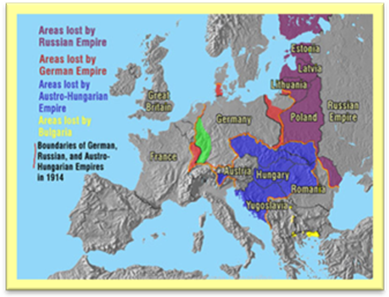
STOP:† Answer Section C Questions
Reaction
to the Treaty of Versailles
The
Treaty of Versailles did little to construct a lasting peace.†† Average Germans saw the settlement as
humiliating and deeply resented the fact that their nation was branded as the
guilty party in the war.† They blamed the
Weimar Republic, the nationís new government, for these harsh terms rather
than the regime of Wilhelm II.† Germany
believed that the treaty should be renounced or, at the very least, revised as
quickly as possible.† Due to the fact
that much of the war had been fought on French soil, France favored a strict
enforcement of the Treaty of Versailles.†
The French counted on the money from reparation payments to repair and
rebuild their country.† Great Britain, on
the other hand, saw the benefit to a prosperous, revitalized German state.† Before the war, their trading partnership had
served the best interests of both countries, and the British believed German
progress was essential to their own economic recovery.
The
Germans made their first installment on the reparation debt in 1921, but they
were unable to fulfill this obligation in 1922.†
Germany asked that their payments be suspended for a period of three
years.† The British were willing to
accept this suggestion, but the French refused.†
In 1923, France moved troops into the Ruhr Valley, a major German industrial center, with the intent of
seizing the regionís coal, iron and steel production as payment for the war
debt.† The German government ordered the
laborers to stop working.† France then
sent 40,000 African colonial troops to secure the territory and attempted to
use the racial prejudice of the times to intimidate the Germans.† With a major portion of their industrial
capacity idled, the German treasury again printed more money.† Prices rapidly increased, and buying simple
necessities required an enormous amount of marks, the basic unit of German
paper currency.† As people lost their
incomes and savings, the German population blamed their government, other
nations, big business and Jewish merchants for their misfortunes.† Eventually, France and Germany realized that
only compromise and cooperation could resolve this issue.
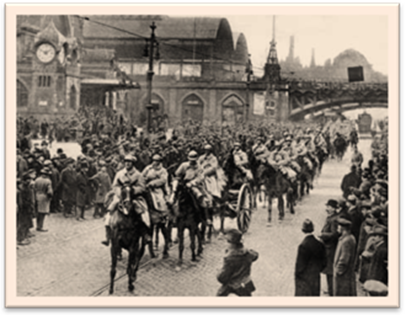
French
Troops Entering the Ruhr Valley
On
the opposite side of the Atlantic, Americans also questioned the Peace of
Paris.† The most controversial aspect of
the settlement in the United States was the League of Nations.† Members of the Senate expressed concern that
membership in the League might cause American soldiers to be ordered into
battle without Congressional consent.†
After an intense debate, the United States refused to join the League of
Nations and did not ratify the Treaty of Versailles.† Finally, the nation concluded the war by
making a separate peace treaty with Germany.†
This was a serious blow to President Wilson, who had been determined to
establish the organization at all cost.†
Americans preferred to follow a policy of isolationism and tried to remain detached from European
affairs.† The United States also limited
immigration with the establishment of quotas in 1921.† However, the global nature of twentieth
century business kept America tied to events in Europe.
STOP:† Answer Section D Questions
A New
Spirit of Cooperation
As
both countries elected more moderate leaders, Germany and France adopted a new
spirit of cooperation.† Great Britain and
the United States believed this was in their best interest as well and
initiated a plan to restructure reparation payments in 1924. †The Dawes
Plan, named for the American financial expert Charles G. Dawes, enabled
Germany to receive private loans from the United States.† Then, Germany made reparation payments to
Britain and France.† These nations, in
turn, repaid some of the large sums of money that they had borrowed from the
United States during the war.† As a
result of American investments, Germany made a remarkable recovery along with
most of Europe, but this success was totally dependent upon a healthy American
economy.
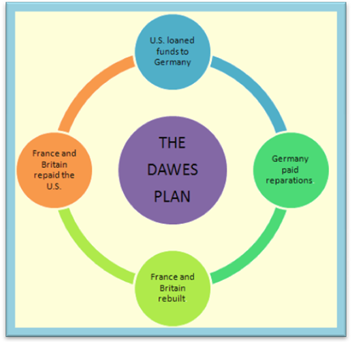
As
the countryís economic status improved, Germany took a more active role in
European affairs.† Gustav Stresemann of Germany and Aristide Briand of France met in the Swiss city of Locarno with
representatives from Belgium, Italy and Great Britain.† The meeting produced the Locarno Pact, a treaty in which France and Germany promised never
to wage war against each other again.†
When Germany also agreed not to violate the borders of France and
Belgium, the League of Nations decided to admit Germany as a member.† In 1928, almost every country in the world,
including the Soviet Union, signed the Kellogg-Briand
Pact.† The participating nations
pledged to avoid military conflict and to rely on diplomacy to settle
disputes.† Although these arrangements
looked impressive on paper, none of the documents provided any means of
enforcing their provisions.† Since the
League of Nations had no military forces of its own, it was not able to
discipline the nations that chose to ignore their commitments.† In spite of these drawbacks, the economic
boom inspired confidence in the future until the key element, Americaís
seemingly endless prosperity, faltered.
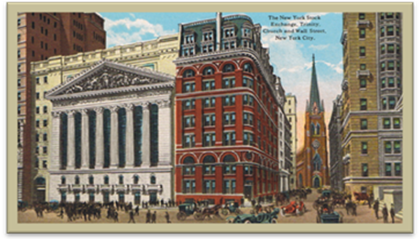
Postcard
of the New York Stock Exchange:† 1909
STOP:† Answer Section E Questions
The
Crash of the American Stock Market
By
1929, the American Stock Exchange in
New York had become the worldís financial focal point.† Stock prices had increased continuously from
1924 to the autumn of 1929, and investors operated on the assumption that the
upward spiral would continue forever.† On
October 24, orders to sell flooded the floor of the Stock Exchange, and a
panic-stricken crowd gathered along Wall Street.† Rumors of suicides and business failures
quickly spread.† In the days following Black Thursday, stock prices declined
even further.† Industrial production
dropped, unemployment rose and wages fell.†
A long period of economic downturn, the Great Depression, had begun.
Soon
the crisis in the United States caused American bankers to request payment on
the loans that they had made to European nations.† This turned the Great Depression into a
world-wide event.† It proved especially
troubling for Germany and Austria.† The
failure of a major Austrian bank undermined public confidence throughout the
European continent as industrial production fell and unemployment rose.† Between 1929 and 1932, international trade
fell a startling sixty-five percent.† In
spite of these hardships, the United States, Great Britain and France continued
to have faith in the democratic process and functioned as republics.† However, other countries, such as Italy,
Germany and Japan, turned to autocratic leaders to revive the economy and to
restore national pride.
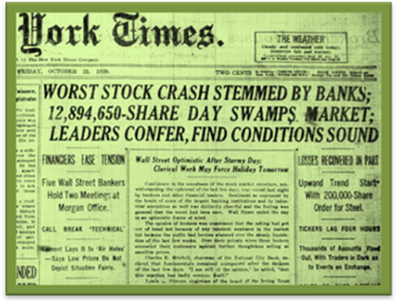
Headline from the New
York Times
STOP:† Answer Section F Questions
What
Does It All Mean?
The treaties
that comprised the Peace of Paris established the conditions for the events
that took place during the remainder of the twentieth century.† The settlement resulted in embittered nations
that turned to dictatorships to solve their economic, political and social
problems.† Other countries chose to
ignore the expansion of these powers and followed a policy of appeasement in
order to avoid further conflict.† The
unpunished massacre of large numbers of Armenians within the Ottoman Empire
established a precedent on which the Nazis based their treatment of Europeís
Jewish population.† Asians and Africans,
who had contributed to the war effort, were also disappointed.† They emerged from the peace process with less
respect for their foreign rulers and with determination to achieve
self-government.† In short, the
consequences of the unsettling settlement of World War I would have long-term
global implications.

Additional Resources and Activities
Unit 14: After World War I,
Nations Were Changed Forever